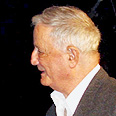
S. Yizhar: created a style, not just literature
צילום: עמית שאבי
Writer S. Yizhar dies
Yizhar Smilansky passes away Monday morning. He was 89. Shimon Peres: "Yizhar gave taste to Hebrew Literature that will never dissipate." Shulamit Aloni: "He was man of peace, man of conscience, very involved and caring
The writer S. Yizhar, of the prominent writers of the founding generation, passed on Monday morning after his heart stopped. He was 89. He leaves behind a wife and three children.
Yizhar Smilansky, whose penname was S. Yizhar, was born in 1916 in Rehovot. He was the son of a writer and a member of the First Aliyah, Ze'ev Smilansky, who was the nephew of writer Moshe Smilansky.
Yizhar won the Israel Prize for Literature in 1959 and worked in youth education in Rehovot and Ben Shemen, fought in the War of Independence, and was a Knesset member from its founding until 1967 in the Mapai and Rafi parties. He was also a professor of education and literature at the Hebrew University in Jerusalem.
Shimon Peres, his friend and admirer: "My friend, Yizhar went with me the whole way. For many years he turned the new Israel into the intellectual homeland of the nation of Israel. There was none like him profound in vision and expressive. He made Hebrew at once a celebration and a challenge. He saw the depth of things and was a part of them. Since Yizhar, Hebrew literature is not what it was. He created a style, not just literature. He was involved in the true decisions of the nation, loved the nation, its sons, its army, and peace. Yizhar gave Hebrew literature a taste that will never dissipate."
Shulamit Aloni, one of his students in Ben Shemen, tells: "I visited Yizhar about a month ago at his house. He was tired and sick, but when I talked of things from that time period, his eyes lit up. Yizhar was my teacher and taught me literature and poetry, history and philosophy. He was a kind teacher, and if I am thought of as a good teacher, I owe it to him. I learned everything from him – the treatment of students, what was important and what was not, the need for enriching the imagination and for curiosity. In the eyes of his students, he is considered the foremost of all Hebrew writers, and in my eyes he is the new Israeli which the first aliyot (immigration waves) dreamt of – someone who could whistle Beethoven, but knew the land through and through, someone with polished Hebrew who loved the light, the sun, and the field. There are no words good enough for him, as a writer, a person, and a friend. He was a man of peace, a man of conscience, very involved and caring."
One of the greatest influences on Hebrew literature
S. Yizhar's early works are influenced mostly by Uri Nissan Gnessin. His later works were influenced by Yossef Haim Brenner. His work is distinguished by the structure of inner dialogue interjected by plot and descriptions of landscape. His style is noted for its total command of spoken Hebrew of our day without slipping into non-standard language. The atmosphere of the Land of Israel and her landscapes is felt in all his stories.The largest and most mature of his works, the novel Days of Ziklag (1958) is a story about a group of lone soldiers in the Negev, one week in 1948. S. Yizhar describes in the novel the ideological and ethical dilemmas pondered by the soldiers. The novel is considered one of the best and most influential on Hebrew literature. He was awarded the Israel Prize for Days of Ziklag at the young age of 43.










